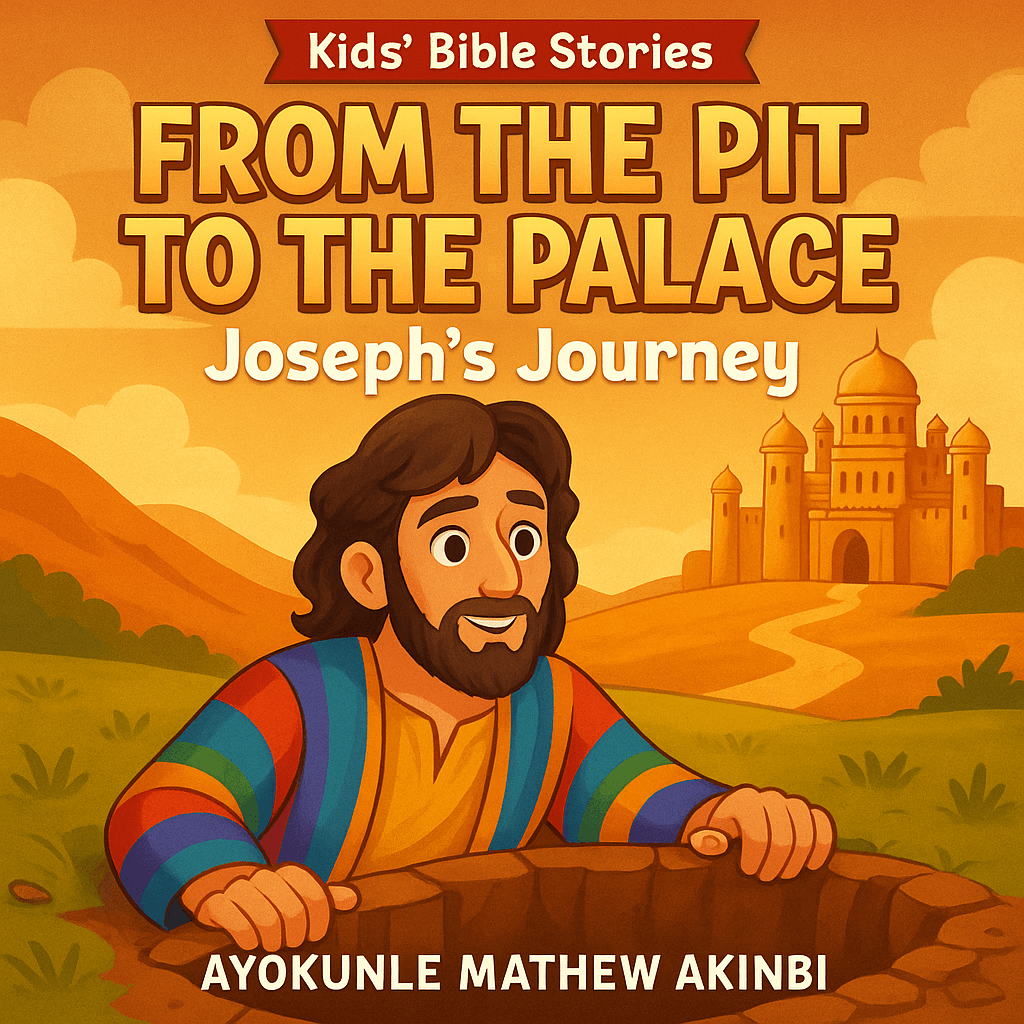“The Healing of the Ten Lepers: Gratitude and Faith Kids Bible Stories” has been added to your cart. View cart
Sale!
From the Pit to the Palace ‘Joseph’s Journey Kids’ Bible Stories
$9.99 Original price was: $9.99.$2.99Current price is: $2.99.
This story chronicles the tumultuous life of Joseph, beginning with his status as the favored son of his father, Jacob, who gifts him a magnificent coat of many colors. This coat, shimmering with deep blues, brilliant scarlets, rich purples, and threads of real gold, was a beautiful story told in thread but also served as a flag of favoritism that ignited a bitter and ugly jealousy in his ten older brothers. Their hatred was further fueled by Joseph’s dreams of the future, in which he saw his family’s sheaves of grain and even the sun, moon, and eleven stars bowing down to him.
Driven by this deep-seated resentment, the brothers conspired against him, and in the fields of Dothan, they plotted his death. They stripped him of his ornate robe, tore it, and threw him into a deep, dry cistern, a dark, gaping mouth in the earth smelling of decay. Instead of leaving him for dead, they sold him into slavery for twenty pieces of silver to a caravan of Ishmaelite traders, who took him on a suffocating journey across the Sinai desert to Egypt.
In Egypt, Joseph became the property of Potiphar, the captain of Pharaoh’s personal guard. In Potiphar’s house, a sprawling villa of cool, white limestone, Joseph prospered, and because of his integrity and competence, he was soon put in charge of his master’s entire household. This period of success was shattered by a test of his honesty when Potiphar’s wife made advances toward him. After Joseph repeatedly refused her, she falsely accused him of assault, using his abandoned garment as proof.
This lie led Joseph from the comfort of Potiphar’s house to the despair of the royal prison. In the dungeon, a place thick with the foul, putrid air of human waste and rot, he once again found favor, and the chief jailer put him in charge of the other prisoners. His gift for interpreting dreams resurfaced when he accurately predicted the fates of Pharaoh’s butler and baker , but he was subsequently forgotten in the dungeon for two more years. His eventual release came only when Pharaoh himself was tormented by troubling nightmares of gaunt cows devouring fat ones and withered grain swallowing the healthy. Joseph was summoned and, after crediting God, interpreted the dreams as a divine warning of seven years of incredible plenty to be followed by seven years of devastating famine.
Offering a wise plan to store grain during the abundant years, Joseph was dramatically elevated from prisoner to second-in-command of all Egypt, given Pharaoh’s signet ring and a new name. When the prophesied famine gripped the lands, Joseph’s foresight saved the nation. This crisis set the stage for a long-awaited reunion when his own hungry brothers journeyed to Egypt to buy food. They bowed before the powerful vizier, failing to recognize the brother they had sold decades earlier. Through a series of dramatic tests, including a tense surprise involving a silver cup, Joseph saw that his brothers’ hearts had changed. This led to a powerful and emotional climax where he revealed his identity, and the family, once torn apart by jealousy, was finally reunited through forgiveness and an understanding of a divine plan that turned their malicious act into an instrument of salvation.
Categories: Bedtime Stories, Bible and Faith-Based Stories, Inspirational and Moral Stories
Tags: Anthologies & Short Stories Bedtime & Dreaming Fairy Tales, bible stories, Folk Tales & Myths Inspiring Feel-Good Mystery, Folk Tales & Myths Mystery Fiction Heartfelt Inspiring Feel-Good, Religions, Religions Heartfelt, Religions Inspiring Heartfelt
Description
This story chronicles the tumultuous life of Joseph, beginning with his status as the favored son of his father, Jacob, who gifts him a magnificent coat of many colors. This coat, shimmering with deep blues, brilliant scarlets, rich purples, and threads of real gold, was a beautiful story told in thread but also served as a flag of favoritism that ignited a bitter and ugly jealousy in his ten older brothers. Their hatred was further fueled by Joseph’s dreams of the future, in which he saw his family’s sheaves of grain and even the sun, moon, and eleven stars bowing down to him.
Driven by this deep-seated resentment, the brothers conspired against him, and in the fields of Dothan, they plotted his death. They stripped him of his ornate robe, tore it, and threw him into a deep, dry cistern, a dark, gaping mouth in the earth smelling of decay. Instead of leaving him for dead, they sold him into slavery for twenty pieces of silver to a caravan of Ishmaelite traders, who took him on a suffocating journey across the Sinai desert to Egypt.
In Egypt, Joseph became the property of Potiphar, the captain of Pharaoh’s personal guard. In Potiphar’s house, a sprawling villa of cool, white limestone, Joseph prospered, and because of his integrity and competence, he was soon put in charge of his master’s entire household. This period of success was shattered by a test of his honesty when Potiphar’s wife made advances toward him. After Joseph repeatedly refused her, she falsely accused him of assault, using his abandoned garment as proof.
This lie led Joseph from the comfort of Potiphar’s house to the despair of the royal prison. In the dungeon, a place thick with the foul, putrid air of human waste and rot, he once again found favor, and the chief jailer put him in charge of the other prisoners. His gift for interpreting dreams resurfaced when he accurately predicted the fates of Pharaoh’s butler and baker , but he was subsequently forgotten in the dungeon for two more years. His eventual release came only when Pharaoh himself was tormented by troubling nightmares of gaunt cows devouring fat ones and withered grain swallowing the healthy. Joseph was summoned and, after crediting God, interpreted the dreams as a divine warning of seven years of incredible plenty to be followed by seven years of devastating famine.
Offering a wise plan to store grain during the abundant years, Joseph was dramatically elevated from prisoner to second-in-command of all Egypt, given Pharaoh’s signet ring and a new name. When the prophesied famine gripped the lands, Joseph’s foresight saved the nation. This crisis set the stage for a long-awaited reunion when his own hungry brothers journeyed to Egypt to buy food. They bowed before the powerful vizier, failing to recognize the brother they had sold decades earlier. Through a series of dramatic tests, including a tense surprise involving a silver cup, Joseph saw that his brothers’ hearts had changed. This led to a powerful and emotional climax where he revealed his identity, and the family, once torn apart by jealousy, was finally reunited through forgiveness and an understanding of a divine plan that turned their malicious act into an instrument of salvation.
Related products
-
Sale!

Ruth and Naomi A Story of Loyalty
$9.99Original price was: $9.99.$1.99Current price is: $1.99. Add to cart Buy Now -
Sale!

Joshua and the Battle of Jericho Kids Bible Stories
$9.99Original price was: $9.99.$1.99Current price is: $1.99. Add to cart Buy Now -
Sale!

The Good Samaritan’s Journey Lessons in Kindness and Compassion Kids Bible Storybook
$9.99Original price was: $9.99.$1.99Current price is: $1.99. Add to cart Buy Now -
Sale!

The Betrayal of Jesus Judas Kiss Kids Bible Stories
$9.99Original price was: $9.99.$1.99Current price is: $1.99. Add to cart Buy Now -
Sale!

The Empty Tomb: Easter’s Surprise Kids Bible Stories
$9.99Original price was: $9.99.$1.99Current price is: $1.99. Add to cart Buy Now -
Sale!

The Sermon on the Mount The Beatitudes Kids Bible Stories
$9.99Original price was: $9.99.$1.99Current price is: $1.99. Add to cart Buy Now -
Sale!

Miracles in the Wilderness The Story of Moses and the Burning Bush Kids Bible Storybook
$9.99Original price was: $9.99.$1.99Current price is: $1.99. Add to cart Buy Now -
Sale!

The Garden of Eden and the Forbidden Fruit: Adam and Eve Tales Kids Bible Stories
$9.99Original price was: $9.99.$1.99Current price is: $1.99. Add to cart Buy Now -
Sale!

Lonely Boys Kids Bedtime Stories
$9.99Original price was: $9.99.$1.99Current price is: $1.99. Add to cart Buy Now -
Sale!

The Walls of Jericho: Joshua’s Triumph Kids Bible Stories
$9.99Original price was: $9.99.$1.99Current price is: $1.99. Add to cart Buy Now


